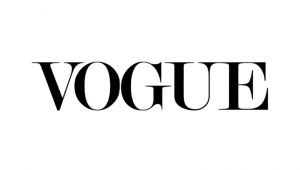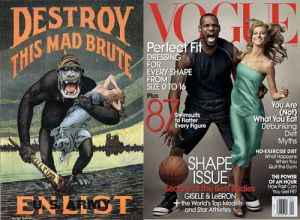Vogue Challenge
Vogue is a monthly fashion and lifestyle magazine headquartered in New York City that covers a wide range of issues such as fashion, makeup, entertainment, living, and runway. Vogue was founded as a weekly newspaper on December 17, 1892, by an American businessman named Arthur Baldwin Turnure. It started as a weekly newspaper in New York City before moving to a monthly publication years later. [1]
In July 1988, Anna Wintour became editor of Vogue and immediately transformed Vogue covers by emphasizing the woman’s body, rather than just her face, as well as by frequently featuring Hollywood actresses as opposed to traditional fashion models, thereby sparking an international trend. Wintour also began Teen Vogue (2003) and Men’s Vogue (2005–2008) in the United States.[2]
Contents
Racism in Vogue
Anna Wintour took over as editor of Vogue in July 1988, and quickly changed the magazine's covers by highlighting the woman's body rather than just her face, and by regularly showcasing Hollywood celebrities rather than conventional fashion models, igniting an international trend. In the United States, Wintour founded Teen Vogue (2003) and Men's Vogue (2005–2008).[3]
Employees at Condé Nast went public with their concerns over the company's treatment of race this summer, but Anna Wintour has previously been chastised over Vogue's portrayals of Black people, including the use of tropes and racial exploitation in photo shoots.
Many Black people who worked with Anna Wintour say they feel so out of place in her world that they developed white alter egos only to get through the day, reconditioning their presentation and dress in an emotionally exhausting way.
Anna Wintour, according to other people of color interviewed, made positive improvements and elevated them to top jobs. Naomi Campbell, one of the first Black supermodels, defended Wintour, who was on the cover of the editor's first September issue in 1989.
Gisele Bündchen and basketball player LeBron James were featured on the cover of American Vogue in April 2008, photographed by Annie Leibovitz. Vogue featured a male on the cover of the American issue for the third time (the other two males were actors George Clooney and Richard Gere), and the first time that the man was black. Some critics slammed the cover for portraying James in a prejudicial light since his pose with Bündchen was reminiscent of a poster for the film King Kong.[4]
Apology
Protests in the United States about the killing of an unarmed black man, George Floyd, by police have sparked a national conversation around social inequality, bringing pressure on big brands and business figures to do more to promote change.
Anna Wintour, Vogue's editor-in-chief, apologized for the magazine's "hurtful and intolerant" faults over her 30-year tenure.
In an internal memo widely published in the media, Wintour said, "I want to say clearly that I know Vogue has not found enough avenues to elevate and offer room to black reporters, authors, artists, models, and other producers." "We've all made mistakes, such as posting hurtful or intolerant photographs or posts. I accept ultimate responsibility for my mistakes."[5]
The New York Times has released a new report into Vogue's latest campaign for diversity, and it investigates why these measures are "too late."[6]
Colored People Contribution in Vogue
As we all know, colored people make up a small percentage of the apparel industry. Edward Enninful, the magazine's current chief editor, was not only the magazine's first male but also the first black editor. On August 1st, 2017, he was selected. He was born in Ghana and moved to London with his family when he was a teenager.[7]
“It would be disingenuous of me not to find out that I am the first black person to ever receive this prize – the first black person in 40 years,” Enninful said in accepting the PPA Editor of the Year for a consumer magazine award in July 2020. Our commissioning is becoming more diverse, as are our pages. "However, what is inside our offices?" Who are we going to hire? How are we bringing up? Who do we want to promote? How do we handle people in our workplaces? Who is allowed to reach the top?”
According to the BBC, when he first started at Vogue three years ago, he said that he wanted the publication to represent diversity and that he was interested in “showing diverse people, different body types, different ages, different classes [and] tackling gender.”[8]
Tyler Mitchell, a 23-year-old Atlanta photographer who took the first African-American Vogue cover in the magazine's 125-year history. Mitchell had previously collaborated with TeenVogue on a cover and other items for the publication, but he said landing the Vogue cover was a major accomplishment. Tyler also shot the cover of Vogue's August 2018 issue, which featured pop diva Beyonce.[9]
#VogueChallenge an Anti-Black Racism Empowerment
In response to the fashion industry's bias, which has left no room for people of color to participate, Black models, stylists, and photographers have taken to social media to share their own versions of Vogue covers, insisting that the industry reform to ensure better diversity and opportunity.
The "Vogue Challenge," which went viral on social media, featured black fashion photographers, models, designers, stylists, and make-up artists reimagining the classic magazine's cover.
In a thread about the challenge, Micah Butler, artistic director of fashion brand Kings Arise Clothes, said, "For way too long in the fashion industry, the doors have been closed to too many black men and women." "Our society is often welcomed, but we are frequently left out. My dream is that things will start to improve. We need to see concrete outcomes "he continued.[10]
External Link
#VogueChallenge by Mutua Matheka
#VogueChallenge by Kabutha Kago
#VogueChallenge on Twitter
See Also
References
- ↑ Warren, Lynne. Encyclopedia of Twentieth-Century Photography, 3-Volume Set
- ↑ Vogue, Britannica, 1 December 2020. Retrieved December 30, 2020.
- ↑ Lee, Edmund. The White Issue: Has Anna Wintour’s Diversity Push Come Too Late?, The New York Times, 24 October 2020.
- ↑ Scott, Megan K. [https://usatoday30.usatoday.com/life/people/2008-03-24-vogue-controversy_N.htm LeBron James' 'Vogue' cover called racially insensitive[, USA Today,24 March 2008. Retrieved December 30, 2020.
- ↑ Milne, Amber.Models, stylists and photographers post their own take on iconic magazine cover as industry reacts to George Floyd protests, Thomson Reuters Foundation, 12 June 2020. Retrieved December 29, 2020.
- ↑ Ahlgrim, Callie. Former Black staffers call for Anna Wintour to surrender control of Vogue, citing the magazine's racist work environment, Insider, 25 October 2020. Retrieved December 30, 2020.
- ↑ British Vogue gets new chief editor after 25 years, The Jakarta Post, 12 April 2017. Retrieved December 30, 2020.
- ↑ McCulloch, Adam.British Vogue editor racially profiled at his workplace. 16 July 2020. Retrieved January 25, 2021.
- ↑ David, Wynne. Tyler Mitchell On Being The First African-American To Photograph A 'Vogue' Cover, NPR, 29 August 2018. Retrieved December 30, 2020.
- ↑ Milne, Amber.Models, stylists and photographers post their own take on iconic magazine cover as industry reacts to George Floyd protests, Thomson Reuters Foundation, 12 June 2020. Retrieved December 29, 2020.





